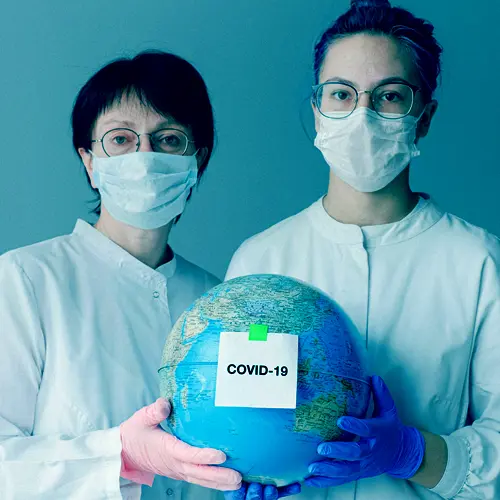Nationwide study of health practitioners, first responders examines use of anti-malarial drug to counter COVID-19
- IN News Mentions
- Source
Sarah Lofgren’s voice had a tinge of excitement when she explained why the bright green dots on one scientific slide disappeared on the next. The co-investigator at the University of Minnesota Division of Infectious Disease and International Medicine showed how SARS, or severe acute respiratory syndrome, represented by those green dots, responded to all the drugs that were thrown at it to determine what could hinder the virus.
As Lofgren’s slide showed, chloroquine was one such drug that could attack SARS, a coronavirus. Now scientists wonder could hydroxychloroquine, a chemical cousin to chloroquine, do the same for COVID-19?
That’s what Lofgren and the U of M team are trying to determine in a two-part national study aimed at 1,500 health workers and first responders who are in the middle of tackling the crippling coronavirus outbreak in the United States.
“We have really good long-term data on hydroxychloroquine for lupus and in malaria. And we know it’s a safe drug. It has plausibility,” Lofgren said.
She suspects hydroxychloroquine works because it may block ACE2 receptors within COVID-19, which would prevent the pathogen from entering the cells of its host. Although a small Chinese study demonstrated hydroxychloroquine reduced fever, cough, and pneumonia in mildly and moderately ill patients, much of the evidence that hydroxychloroquine is effective is anecdotal. Governments are cautioning doctors from prescribing the drug, including the European Medicine Agency whose officials said in a statement this week that hydroxychloroquine and chloroquine should only be used in clinical trials and emergency situations. Experts warn shortages of these drugs due to coronavirus mean patients typically prescribed these medications — those with lupus, rheumatoid arthritis, and malaria, among other illnesses — won’t get the treatment they need.
However, procuring hydroxychloroquine shouldn’t be a long-term problem, Lofgren said. She is confident that partnerships with New Jersey-based Rising Pharma Holdings Inc., operating as Rising Pharmaceuticals, and Laurus Labs Limited in India, companies that have donated hydroxychloroquine to the U of M study, would mean Americans suffering from coronavirus could get the treatment they need, assuming the drug works for this use. Rising Pharmaceuticals is the exclusive distributor of the drug in the United States.
The U of M trials examine healthcare workers before and during exposure to coronavirus. In an ongoing study, participants also include household contacts of these health care professionals. Scientists have identified health care workers who have been exposed to coronavirus but aren’t yet symptomatic, as well as those who are experiencing symptoms of the disease. A Centers for Disease Control and Prevention publication described health care workers infected with coronavirus earlier this year and noted 10 percent of household contacts contracted coronavirus. Compare that to the less than 1 percent probability these same household contacts would be exposed to the virus if they circulated among the general public. In those already exposed individuals, a five-day course of hydroxychloroquine similar to malaria treatment will be administered. The researchers are still recruiting for that study.
In the study beginning next week, first responders not infected with the virus will receive hydroxychloroquine as a pre-exposure prophylaxis. Participants will get weekly or biweekly doses of hydroxychloroquine in a similar manner as someone might take if preventing malaria. However, there are potential side effects, including gastrointestinal upset, which might be confused with symptoms of coronavirus. Results from the study’s placebo group should clarify those differences, Lofgren said.
“We’re hoping that we get enough positive events that we will stop the trial early,” she said, adding that the goal for better outcomes includes carrying out treatment early in disease progression.
The scientists anticipate administering hydroxychloroquine pre- and post-exposure to coronavirus could result in 50 percent reduction in patient symptoms, hospitalizations, and admissions to intensive care units.

Nand Desai is dedicated to driving strategic transformations and integrations within the organization, leveraging his extensive experience across all functional groups to ensure successful execution. He holds a BBA from the University of Michigan – Ross School of Business. Before joining Rising, Nand was engaged in private equity at H.I.G. Capital, where he focused on middle-market opportunities. He began his career as an Analyst in the M&A group at Greenhill & Co., gaining valuable experience in financial analysis and advisory services.

Nand Desai is dedicated to driving strategic transformations and integrations within the organization, leveraging his extensive experience across all functional groups to ensure successful execution. He holds a BBA from the University of Michigan – Ross School of Business. Before joining Rising, Nand was engaged in private equity at H.I.G. Capital, where he focused on middle-market opportunities. He began his career as an Analyst in the M&A group at Greenhill & Co., gaining valuable experience in financial analysis and advisory services.